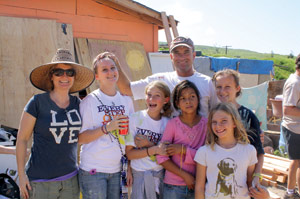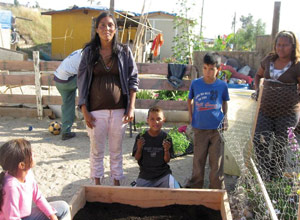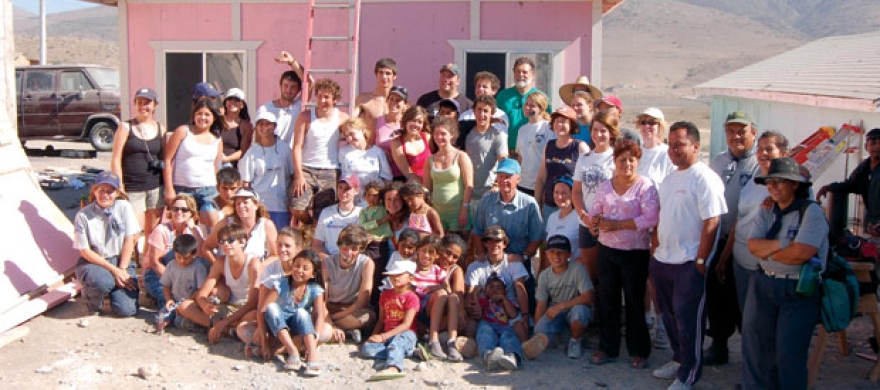Dust to Dust
Ray Meltvedt was a churchgoing undergraduate in early 1980s Malibu when he experienced a profoundly simple religious epiphany.
Ray Meltvedt was a churchgoing undergraduate in early 1980s Malibu when he experienced a profoundly simple religious epiphany.
"The local church I was attending had just spent $2 million on a remodel and yet they ignored starving children only 200 miles away in Mexico, practically on our doorstep," Meltvedt recalls. The contrast in priorities shocked him. "I decided not to theologize the Bible anymore, but to actually just do what it says."
Meltvedt turned to James 1:27 in the Bible, a passage that directs believers to look after orphans and widows in distress, as the most practical application of his faith. He established Clubdust.org, a missions operation devoted to building homes for, donating essentials to, and supporting the trades of families in Mexico. Thirty years later, the nonprofit has well surpassed Meltvedt's modest ambitions.
"Being a business major with goals, I had a picture of myself in the future at 40 years old with 40 houses built. The part I didn't calculate in my plans was having people help out and by the time I actually turned 40 years old I had over 500 homes built," he says. "By inviting people along for the ride, I'm now 51 with over 1,000 homes built for those in need in Mexico."

Ray Meltvedt ('82) takes his calling to serve the poor directly to the homeless and disenfranchised in Mexico with his nonprofit Club Dust
Club Dust was recognized as a California nonprofit corporation in August 2002 and operates entirely from donations with zero administrative overhead. Hector Perez Rubio, a pastor in Tijuana, preps for Club Dust's projects throughout the year by choosing families and coordinating the buying of wood and materials. A group of 30 to 300 volunteers builds 16'x 20' homes on concrete foundations for families that own their own land and 10'x 12' "portable" homes for families living in squatter camps along the railroad tracks. They get as many supplies from local businesses as possible and buy meals from local families.
When Meltvedt first visited Tijuana in the earliest days of the organization, it was the children that stood out to him—children with heads covered in lice and with limited access to real nourishment and education. He extended his first mental picture of Club Dust to include an image of his future children standing with him in Mexico, helping children born under less fortunate circumstances.
"Our kids understand that life is a wonderful combination of giving and taking," says Meltvedt, who now has three daughters aged 9, 12, and 19. "Club Dust has two goals: 50 percent is the application of James 1:27. But the other 50 percent is providing the foundation for my children, adults, or anyone who wants to help, to experience being in a third world-like environment, a place of great need which has no back-up systems for its people, like social security or food stamps."

Irene with her children in their vegetable garden
Meltvedt holds up one woman, Irene, as a prime example of someone who desperately needs such a system. In a portable home built by Club Dust along the train tracks, she lives with seven children, a drug-addicted, largely absent husband, and no identifying paperwork. "Without paperwork her kids couldn't go to school. The children are just wonderful—they are God's loved creation. The fact that they were born into such a situation doesn't qualify them for such poverty," says Meltvedt.
Knowing that the cycle of poverty would continue for Irene's children without an education, Meltvedt made a plan last year to get them in school and began the exhausting, bureaucratic process of procuring government IDs for them. None of them even had birth certificates—the first requirement for them to get a spot in the local elementary school.
"There is no difference between Irene's kids and my kids, yet mine go to school and hers couldn't," he remarks. By September 2010 Club Dust had attained IDs for four of the children and bought them uniforms and backpacks to start school. "There are hundreds of kids who don't go to school for the simple reason that they can't afford the uniforms required by the school policy. Our newest focus is on getting kids into school; we are committed to getting at least 500 of these kids into school where we build."
Today Meltvedt's own children travel with Club Dust each month and in September they hosted a party for Irene's children. The girls and their mother Robin, a 1983 Seaver College graduate, also cheered him on when he completed a 20-mile swim from Catalina Island to Palos Verdes this September. The swim raised over $17,000, and the money has already bought hundreds of uniforms for children in Mexico. Now the organization is working on starting an active microfinance project there as well.
"Through the experiences of Club Dust we have learned that practical faith is about joining together with people to meet the needs of this world one person at a time," says Meltvedt. "Volunteers are grateful to serve, families in need are grateful to be served, and everyone has a sense of belonging because anyone is welcome at a Club Dust trip. The world's problems are really just lots of small problems that can be solved one human being at a time."
The Waves of Service movement celebrates, supports, and connects Pepperdine alumni committed to volunteerism and careers of service worldwide. Learn more about alumni like Ray Meltvedt and how you get can get involved at www.pepperdine.edu/waves-of-service.
